#yotsubasa rikiya
Note
I agree with the parallels between tenko and eri but I remain resolute that Tenko is long gone and can't be saved at this point. If he was taken in by someone whom did properly teach him right from wrong as a child yes but Shigaraki is an adult that was raised to seek nothing but destruction and has committed many many murders at this point. People seem to ignore the fact that person might not want to be saved. 1/2
Eri is a child with very little agency of her own, but Shigaraki is an adult who can make conscious decisions of his own. I think either deku will save shigaraki by putting him out of his misery or shigaraki will show deku that he cant save everyone 2/2
Thank you for sending me this ask anon! Once again you’re free to have your own opinions, I just hope you’ll join me for a discusssion of ideas.
Let’s choose to focus on this idea you have that Shigaraki is “Someone who is long gone”, because I believe the story establishes the opposite. I agree in fiction there are villains that need to be defeated rather than saved. The reason I am arguing that Shigaraki can be saved is not because I peresonally want him to be, or I believe he’s owed it, but because those ideas are present in the text itself.
Shigaraki is a Villain who Fights other Villains
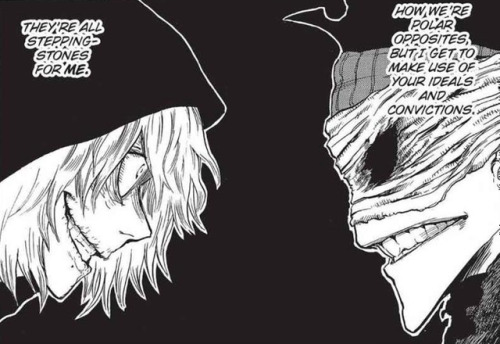
The reason Shigaraki is constantly facing off against other villains, is to make the comparison between them. To show that there are villains who unlike Shigaraki, are set in their ways and not capable of learning from their actions. These villains are past the point of no return in a way that Shigaraki isn’t because his arc is structured differently. Shigaraki is a character that experiences positive growths, whereas these villains are characters that experience negative growth and spiral out of control.
The reason Shigaraki is constantly compared to other villains is to show that he is not the same as them, because he can do better.
1. Shigaraki and Stain
Shigaraki and Stain are foils mostly in what direct opposites they are. Shigaraki was raised to become a villain, Stain is someone who was on the hero path who decided to become a villain. They both try to destroy heroes but for different means, Stain is someone who believes in hero society and wants heroes to improve, whereas Shigaraki wants the destruction of heroes.
Shigaraki believes heroes are incapable of saving anyone and they provide a false peace. Stain believes that heroes are an ideal, and they should save everyone. Stain considers himself to be righteous, while Shigaraki’s entire identity is built around him being a villain who wants to destroy for no reason.
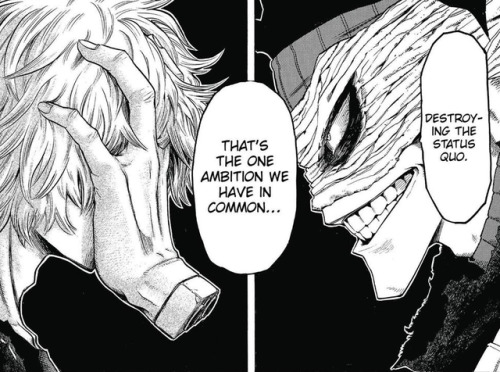
Stain is driven by a grand cause, Shigaraki works in antithesis of a cause. Their only similaritiy is that both of them are sick of the world the way it is and want to disrupt it. They are total opposites that have one thing in common, and Stain pretending to be a hero even while acting as a villain is the exact thing that Shigaraki hates. He even laughs at the fact that Stain believes his actions have a positive effect of the world. Shigaraki being someone fundamentally at his core someone who rejects everything.
At first it seems that Stain is the superior villain because he at least has morals he follows, and a code of honor. As opposed to Shigaraki who seems like a child throwing a tantrum who just wants to rampage, and destroy and get away with it.
However, important to the comparison between the two characters. Shigaraki hates righteousness and does not want anything positive to come out of his actions so why does Shigaraki turn out to be more sympathetic of a character in the end. Simple, stain’s flaws cause his ruin, whereas Shigaraki’s flaws are something he grows from. Stain’s main flaw is his pride.
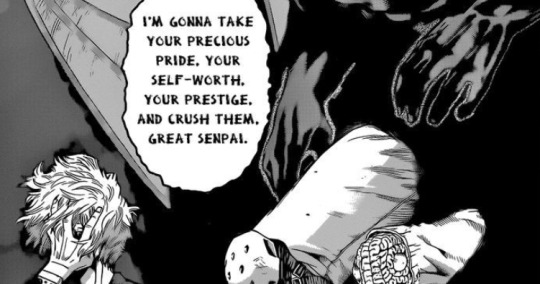
Despite saying that he wants to improve the world with his actions, Stain decides everything on what he personally thinks is best. Due to the fact that he’s doing this entirely alone, his views have become warped. Stain can justify almost everything for his supposed good cause. He goes from wanting to purge heroes that are genuine problems like Endeavor, to trying to kill Children because they were witnesses to his crime.

The main flaw in Stain is that he fights alone, and because of that he thinks he’s absolutely in the right and can justify anything to himself for the sake of ideals. When he is like this, he cannot grow or change. Stain loses a battle that is simply a matter of numbers, he easily disables Iida, but then loses when Todoroki and Deku come to back him up. Stain had conviction, but it turned into stubborness and pride when he decided he had to save the world entirely by himself.
Not only that but Stain’s overreliance on his idenpdence and physical strength shows that he is repeating the abuses of the hero system he himself thinks is rotted. The reason the system is wrong is because people rely too much on individuals with strong and flashy quirks like Endeavor. Individual strength is something that has come to matter far more than saving people. Yet, here is the way Stain wages his war, he picks out weak heroes and kills them, and does so by using superior strength to cull them. In trying to destroy Endeavor’s ideas, due to his methodology stain ends up reinforcing him and turning into the exact kind of hero, one who preeches survival of the fittest.

Just like Endeavor he stops caring about the victims caught in the crossfire of his actions. He gets far less choosy as he goes on, and starts killing people who are not the corrupt heroes he claims to be weeding out.
What does Shigaraki do immediately after losing to Stain. He starts making allies, and using them in smarter ways rather than trying to handle everything by himself with the use of the Nomu AFO provides him. Shigaraki, unlike Stain, is able to make and keep allies.
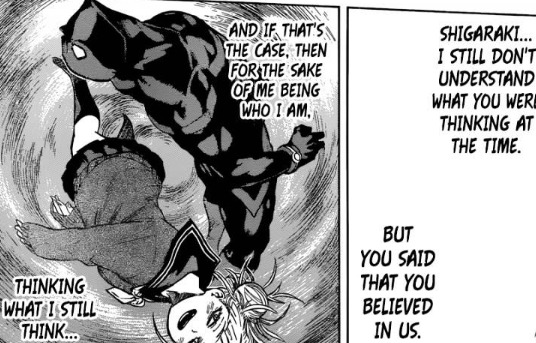
Shigaraki cannot find a cause that people believe in, so he starts bonding with his allies as a person and gets them to believe in him as a person. Shigaraki is capable of genuinely connecting to people in a way that Stain is not, which supports his grown as a person.
2. Shigaraki and Chisaki
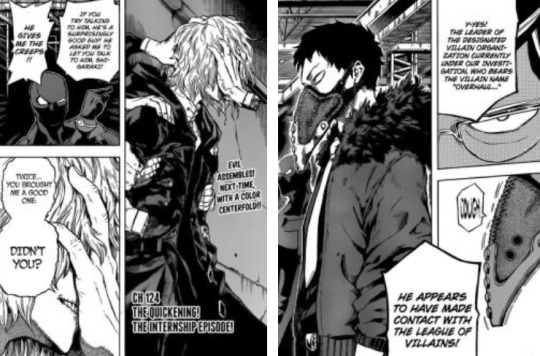
Unlike Shigaraki and stain, Chisaki and Shigaraki actually have several similarities in common. They are both heirs to the crimminal underworlds who have ambitions to rule over the underworld. They are both also abandoned children who were taken in and raised by a crimminal to ultimately be a tool of that person. They both have in their possession, allies that would die for them. They both act out of a central desire to please their father figure who in the end regards them as only a tool. They are both intellectual cold thinker types who lead a gang of eccentric.
Yet, the difference between the two of them becomes as clear as night and day in the way they treat their allies. Once again, with their conflict it’s established why Shigaraki is someone capable of changing his ways, whereas Chisaki is someone doomed to fail due to his own flaws.
Chisaki is someone who sees allies as completely expendable. That they exist as pawns to be used and nothing else. His criticism of Shigaraki is not how he mistreated allies in the past, but that he did not make proper use of them. He only sees people as how they can best be used.
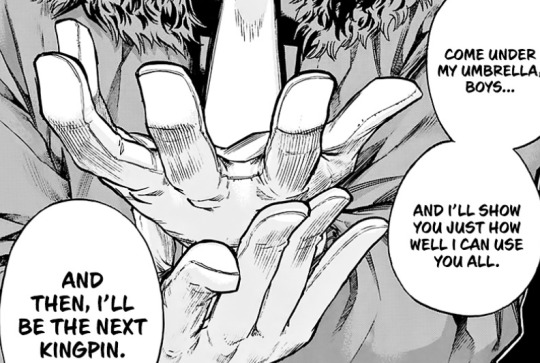
Shigaraki’s response is not to make better use of his allies. He does the opposite of Chisaki, and starts to value the lives of the allies around him more. He learns to see worth in life when Shigaraki had absolutely no regard for human life before this.

Not only that, but he opens up to his allies as a person. This is even said to be the main difference between Chisaki’s precepts and the League of Villains.

Shigaraki takes off his mask and becomes far more of a person in front of his allies. We are supposed to notice his change he is even drawn differently. We’re meant to compare this to the face he showed to Deku the last time he took his mask off, and realize that the face he presents to his allies is now much different.

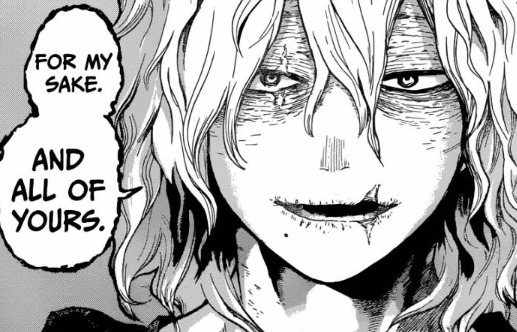
Chisaki is unable to see any value in life, especially in the people underneath him because ultimately he himself is a tool. He is never able to earn the recognition from the leader of the Yakuza he wants, because he can never be that man’s son, at best he is a good tool. Which is why he himself spirals into tragic failure at the end of his arc.

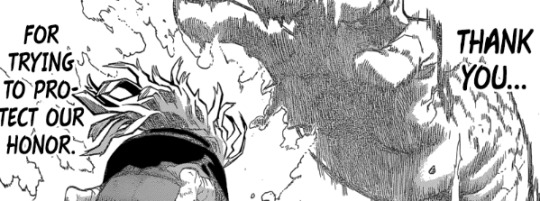
Shigaraki and Chisaki are both victims in the same sense. At their heart both of them are trying to pay back the man who took them in. However, I do not go out of my way to say that Chisaki is going to be saved because that is not what his arc was leading to.
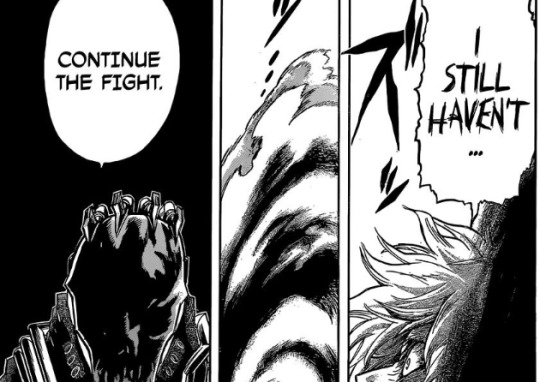
Chisaki showed nothing but negative growth. He just spiraled towards the end. The plot goes out of its way to show that Chisaki is fixated and stuck in his ways, while at the same time Shigaraki is capable of change. The plot even gives a reason for this, Chisaki is closed off to the others around them and only sees them as tools. Shigaraki starts to see his allies as people, and because he takes their thoughts and feelings into consideration changes in his interactions with them.
Even Chisaki’s own childhood friend is considered one of the expendable ones. Not only that, but we have that same friend directly say that Chisaki is so incredibly focused and set in his ways that it’s almost distrubing.

Chisaki gives people worth by using them. Shigaraki gives outcasts a place to belong, the comparison between the two of them shows Shigaraki as growing and Chisaki is not.
3. Meta Liberation Army
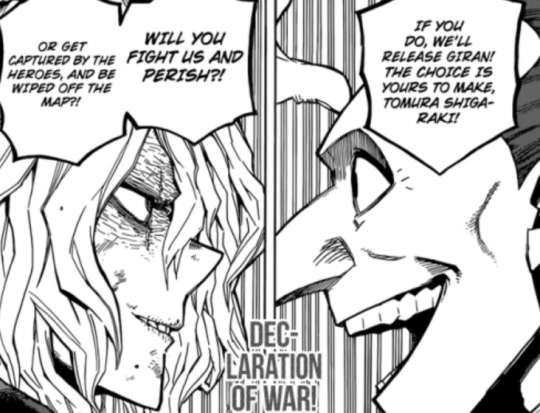
Shigaraki and Re-destro are also characters with several similarities. They are both raised to be the heir of a villain because of who they happened to be born to, Shigaraki because he is Nana’s grandson, and Re-Destro is a bastard son who inherits the burdens of a father he never met.

They were both raised in an extremely cult-like environment, and groomed to be villains by people who did not care about their development as people but rather how they could best be used as symbols for a cause. Rikiya was there to inspire the followers of Destro and carry on his will, Shigaraki was raised to cling only to negative emotions and be a symbol of fear.
In that regard, Re-Destro is every bit the victim that Shigaraki is. They are both child soldiers of a sort, raised for a cause that was not theirs. Of course they see no value in life, because the both of them have been kept from the outside world for so long and have had their perspectives entirely manipulated by people who pretty much dictated their entire childhoods.
Yet, once again we see in the comparison, Shigaraki is someone who is capable of changing in a positive way, whereas Re-Destro only experiences negative character development. A major difference is how they treat their allies.
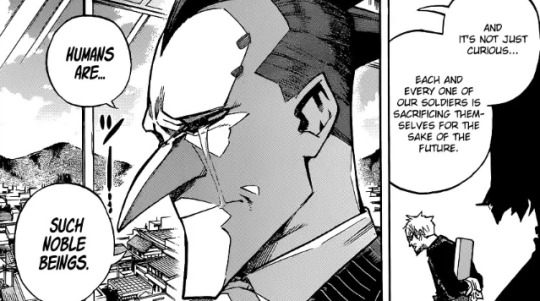
Rikiya raises people to be completely expendable and die for a cause, and clearly values ideas far more than he does individual lives. He plans an attack and ends up sacrificing hundreds of people against the league of villains because he does not like their reputation. As opposed to Shigaraki who gets the entire league to agree to a plan to save one of its members because every member of the league is equally valuable to him.

Shigaraki is capable of reaching his people and connecting them on a personal level, because unlike Rikiya who just does exactly what the cult that raised him tells him to do and only accepts other people’s values, Shigaraki is starting to create an identity of his own away from All for One. Rikiya believes that it’s an honor and a burden to follow the destiny that was thrown on his shoulders as a child, where Shigaraki knows ultimately that growing into what All for One wants to be is something that will never satisfy him.

Shigaraki differentiates himself from Re-Destro because instead of trying to chain himself to it, Shigaraki is someone desperately trying to free himself from the history that burdens him.
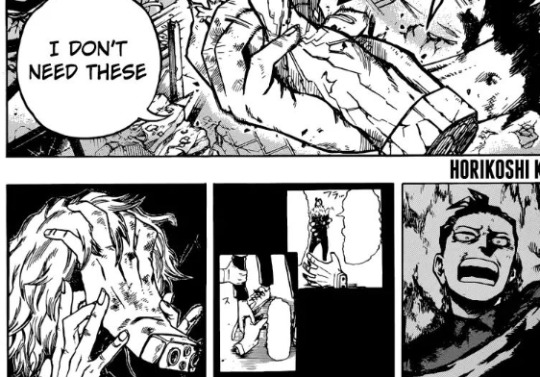
Shigaraki wants to escape his past and develop into his own person, and he also wants the same for his allies around them. That is why he unlike Re-Destro has a character arc.
Shigaraki’s arc is about growing into his own person outside of AFO’s influence, and because of that it makes no sense for him to just die as the villain that AFO wanted him to be. The best resolution for his arc is for him to grow into his own desires and realize what he wants. In order to do that, just like when he needed to accept and value his allies in order to start his development after the Stain Arc, Shigaraki needs an outside perspective on his life like Deku to show him that things could be different, that there’s another way even for someone like him.
If Shigaraki were past the point of no return he would not be shown to be capable of changing. There are villains in the story that are already past the point of no return, but they are not Shigaraki, and not only that but the story always compares them to Shigaraki to show that he’s learning to be better than them.
#Anonymous#mha meta#shigaraki meta#metasks#my hero academia meta#shigaraki tomura#yotsubasa rikiya#kai chisaki#stain
167 notes
·
View notes
Text
One Bad Day - League of Villains
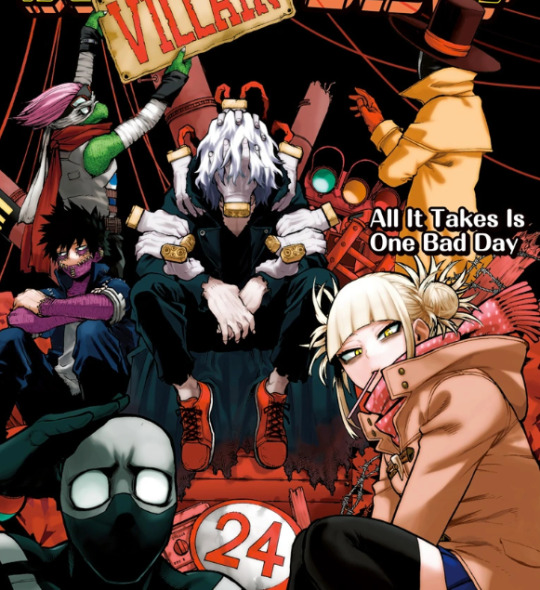
can you explain the meaning of all it takes is one bad day meaning my hero academia? I saw it used with twice but i thought that it might appy to some of the villians we saw in the manga.
In the most recent arc “My Villain Academia” the story flipped to the villain’s side rather than the heroes and we saw the world through their eyes. In that same arc, Hori made several allusions to The Killing Joke by Alan Moore, a comic that explores a darker take on the relationship between batman and the joker and one potential take on the Joker’s Character. It just like My Villain Academia is a story told mainly through the villain’s eyes rather than the hero’s, and it’s all about the narrative a villain tells himself.
What was Hori’s purpose in referencing the killing joke? Did he take inspiration from the story? Is he just a nerd making a comic book reference? Did he believes the themes espoused in the Killing Joke to be true? Let’s take a look under the cut.
1. The Killing Joke
The most logical place to start is with the material Horikoshi is referencing himself. I read the Killing Joke several years ago, and reread it for the purpose of this meta. The funny thing about the killing joke (har har) as it’s one of those stories that gets misinterpreted a lot by fans.
It’s actually a pet peeve of mine when people blame the original work itself, like saying it’s Fight Club’s fault that people misread it. The common misreading of the text is that Joker is right, that he’s actually this really deep person that sees through the lies of society. Even when the entire point of the story is that Joker is wrong, the characters even say this out loud as direct dialogue. This story is the exact opposite of subtle, it’s very in your face with it’s themes, almost too loud.
People confuse the Joker’s own personal narrative, that he sees through these things and is therefore deeper and more aware than anybody else, with the framing of the story that frames Joker as petty and shallow. But, you could have Joker wear a t-shirt that says “I am wrong and a hypocrite” the entire work and people would still misread it.
The point of this preamble being, I don’t think Hori misinterpreted the killing Joke. I do not think his reading of the story is so shallow he referenced it because the joker is a cool villain who says cool things. I hope that will show as I continue, that there is a lot of thought put into these connections. Even if it’s not a direct adaptation of the themes of the killing work the two separate works make for a really interesting comparison.

Joker says many things about the world., but the killing Joke isn’t about the world at all, nor does Joker really care about the world. The Killing Joke is not a comment on society, it’s a character study, primarily about the relationship between Batman and the Joker. It starts and ends with the titular killing joke.
See, there were these two guys in a lunatic asylum, and one night, one night they decide they don’t like living in the asylum anymore. They decide they’re going to escape. So, like, they get up on the roof and there, just across this narrow gap, they see the rooftops of the town stretching away in the moonlight, stretching away to freedom. Now, the first guy, he jumps right across with no problem but his friend, his friend daredn’t make the leap, y’see. Y’see he’s afraid of falling. So then the first guy has an idea. He says “Hey, I have my flashlight with me. I’ll shine it across the gape between the buildings. You can walk along the beam and join me.” But the second guy just shakes his head. He suh-says. He says “wh-what do you think I am, crazy? You’d turn it off when I was halfway across.”
The Joker's joke, which is an analogy of how hopeless it is for one insane man to try saving another insane man. It's so sadly relevant, Batman can't help but join the Monster in bitter laughter. The entire story is a character study of the foiling between Batman and the Joker, and how both of their actions, becoming a hero, becoming a villain, is a response to meaningless tragedy in their lives. Yet, even if Batman recognizes that they’re both victims in a way he can’t save joker, because it’s impossible for one insane man to save another.
That is the main theme, of the Killing Joke. In a way it’s a failure of empathy, because batman’s methods won’t save the joker, punching him in the face won’t fix him. That is also what I believe Horikoshi disagrees with.
The main conflict of the Killing Joke is that the Joker is trying to make a point. That he’s not that different from everybody else, that anyobdy when exposed to the meaningless tragedy of the world would go insane. That it’s the right response and everybody else, clinging to to society, and it’s made up rules are the ones who are really man.
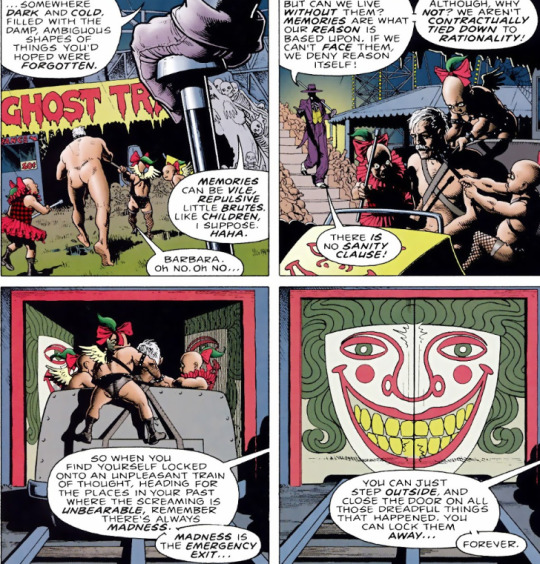
It’s basically what is called moral nihilism.
Moral nihilism is the meta-ethical view that ethical claims are generall false. It holds that there are no objective moral facts, or true propositions - that nothing is morally good, bad, right, wrong, because there are no moral truths.
Basically, because morals are made up ideas by human beings therefore morals cannot exist. The thing is while it insists there is no value to the things we believe are proper and right about the world, it’s not Nihilism or not in the nietzschian sense of the word.
See, the thing is Joker is right that all of these institutions are meaningless, that they’re not as set in stone as humans would like to pretend they are, that the earth under your feet could fall out under you at any time.
But that realization is not necessarily something that leads to evil, or even madness. Like, nihilism is very subversive of power structures. People use the idea of meaning, they use ideas, they use the way the world currently is as unfair as it is to insist that the world has always been that way, to keep in power. Therefore, rejecting what you are told by existing power structures and finding their words meaningless and thinking critically instead is something that could lead into something better. The formation of new ideas inevitably involves the rejection of old ones as meaningless.

However, the joker isn’t interested in any of that. Nothing he says is subversive of power structures at all. He doesn’t care about the injustice of the world, or the way power structures let people like him fall through the cracks. In fact, Joker recreates the same power structures he is trying so hard to subvert and laugh at.

Joker’s entire (possible?) backstory is that he was a victim of poverty that the world didn’t really care about, was utterly indifferent to, and the realization of the world’s indifference to him is what drove him mad in the end. However, the thing about the Joker is, he sucks at telling jokes. His attempted parody or satire just ends up recreating the same ideas of the society he is trying so hard to say that he’s above.
In his backstory, the Joker makes a pretty misogynist joke. While a victim of poverty himself, he looks down on women victims of poverty who sell their own bodies and try to live just like he is. Joker’s problem isn’t society itself, it’s that he’s the one being stepped on, and not the one stepping on others because he thinks it should be the other way around. A guy like him should have never ended up society’s victim, society’s punchline.

Which is why he insists that he’s normal. He’s the same as everybody else. And in a way he’s right, Joker reflects the attitudes of society, he’s sexist, he looks down at the poor, it’s implied he takes his feelings of inferiority out on his wife. He’s normal for all of those reasons, not because it would be normal to go insane.

Also, this is just a side tangent but there’s a lot of philosophy on whether normal people are good or bad which is too lengthy to get into, but whether people are born good or bad by default, normal people will carry within them the ideas society raised them in.
“You must stop your fooling around with women. You’ve gone far enough. Society won’t stand for more.”
What, I wondered, did he mean by “Society?” The plural of human beings?
No longer Human, Osamu Dazai.
Society is the plural of human beings. Joker is a part of the same society, a reflection of the same society, a response to it, just like any other person is, and in that way he’s normal and not as outside of society as he believes himself to be.
The work then goes on to make the point that while this may be our society, there are also people who try to be better even in situations like these. Gordon the entire time, tells Batman it’s wrong even if Joker is a bad person who murders people, to beat him up because police brutality is wrong.

So we finally reach the scene which Hori is quoting. Joker’s speech to Batman, the grand point that he is trying to prove. That everybody is the same as he is, they just haven’t realized it yet. That anybody would have gone mad being put through what he was put through, the revelation that everything was meaningless.


However, once again Joker doesn’t actually care whether society is meaningless or not. In fact, his actions are the opposite of NIhilism. He is trying to make a point. A point, as in, the opposite of meaninglessness. He thinks there are ideas that are correct, that there’s such a thing as being right about this world.
Which is why we see is his slow breakdown amidst his own monologue. What he really wants is to prove to someone else his perspective is correct. So that he can finally feel justified in it, and maybe because batman isn’t responding he has to pause a minute and consider that he’s wrong?

What Joker fears is true meaninglessness. So everything he does isn’t reveling in meaninglessness like he supposes, it’s the opposite of it. He’s trying to create a narrative to life, he’s trying to give it themes, he wants to teach a lesson. Joker’s views are just a reflection of the society that created him. Joker thinks everybody else is wrong, but the idea that he himself might be wrong genuinely breaks him.
Which is why Batman’s line here is so important. Because I’ve heard it before. What Joker says is no different from society. He carries the same attitudes. Society isn’t just some idea floating out there, it’s made up of human beings, people like the Joker.

So, the work of the Killing Joke itself is subversive to the idea that one bad day is all it takes to turn anyone into a villain. However, at the same time the Killing Joke is not trying to make a point about society, or insanity, or victimhood and trauma or anything like that. All of those ideas present in the work, but they are basically just window dressing because the central part of the story is a character study between Joker and Batman, two people who let their entire lives be ruined by one bad day.

However, at the same time Killing Joke is heavily flawed. Just like the joker is misogynist, etc. etc, the work itself is rife with the nineties it was made in. On that front it’s much more a product of its time than ahead of its time in any signficiant way. Like, there’s the obvious fridging of Barbara Gordon, but also as I said the point they are trying to make isn’t reflective of mental illness or trauma or anything like that. The joker went mad because he was a bad person to begin with.
See the thing is I also believe that mentally ill people are perfectly capable of being bad people at the same time. There’s nuance there. No Longer Human, by Osamu Dazai is an example of this. The main character isn’t a bad person because they are mentally ill. The fact that they are a victim of trauma never goes away throughout the book. Yet at the same time, you see the person just uses other people as things for them to cope with, they could care less about the feelings of others, they see no one else as an individual. The way they cope with their mental illness when they are given access to healthier alternatives, is what makes them a bad person.
While yes that is also a part of the Joker’s character, he’s always been double sided as a bully, as someone who is looking for an excuse to exploit others not really to make any kind of point. Which is why the ideas of mental illness and victimhood and whether society is at fault for creating people like this by the act of letting people fall through the cracks isn’t really suited to a character like the joker. This is something Alan Moore himself admits.
I’ve never really liked my story in The Killing Joke. I think it put far too much melodramatic weight upon a character that was never designed to carry it. It was too nasty, it was too physically violent. There were some good things about it, but in terms of my writing, it’s not one of me favorite pieces.
“Alan Moore”
There are a lot of ideas about society brought up in the Killing Joke, but none of them are substantial, and none of them really matter because the work itself is not trying to develop them.
However, the ideas themselves are still good which is why I like to think Hori’s work in My Hero Academia, his insistence that one bad day is what created people like Shigaraki, Twice, and Redestro is not a misinterpretation of Alan Moore’s message but in fact an interesting response.
2. Shigaraki’s Bad Day
There are a lot of connections between Shigaraki, the character and the Joker for instance, it’s pointed out right a way in the same sense as the Joker is throughout the entire Killing Joke comic, that he does not really mean what he says and he isn’t actually trying to prove any kind of point through his actions.
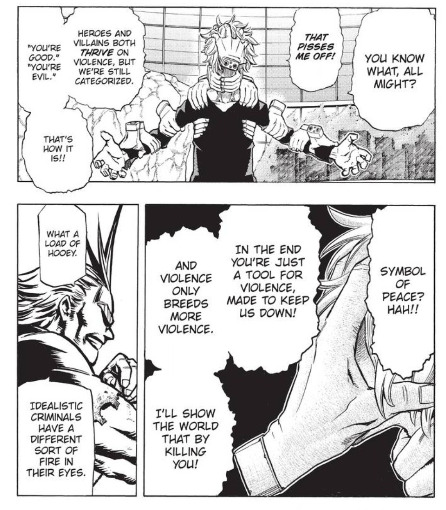
However, Horikoshi’s writing and humanization of Shigaraki is really different and takes a different direction than the Joker. Here let’s talk about good victim bad victim again.
The reason good victim bad victim is bad, because it basically tries to strip away victimhood of characters in order to render them in black and white ways. It gives the implication that reacting certain ways to trauma makes you a bad person. The feelings of the victim are entirely stripped away and they’re stopped from being seen as a human being, because other people want to fit them into a simpler black and white narrative.
Nuance is the best way to approach these scenes. So, let’s look at this scene with what we now know. Shigaraki is a victim of abuse. Not only that but he became a punching bag for his father, directly because All Might’s Master abandoned his father to raise All Might Instead. He was raised in domestic violence, and then adopted by a violent person and molded into becoming more violent raised with no stability, no home and constantly exposed to danger that would threaten his life.
So, yes Shigaraki’s words might be nonsense but the feelings behind them are still real. This is what All Might’s Mistake is, he could not care any less about the feelings that the person he is fighting has, and he just sees them as someone to punch in the face. This is also something that bites him later when he realizes that Shigaraki actually was someone he was connected to.
Of course All Might is trying to save a bunch of kids, does he really have time to listen to the feelings of somebody threatening to kill kids? Who knows. That’s the thing about reality, it is mesy and indefinite, there are more important questions to ask then whether victims are good or bad. You could also say at the same time that All Might is completely oblivious to the feelings of victims of abuse. That he still fails to see what kind of person Endeavor is, and insists he has good things to teach people, because Endeavor is a part of the same sytem that heroes is.
Anyway, the point of that tangent was to establish a good aspect of Hori’s writing, characters are people first. Shigaraki is a victim first before the question of whether he is a good person or a bad person is even asked.

Shigaraki is also, someone like the joker thinks he seees above society because he sees it from an outsider’s perspective. He views other people as clinging onto meaningless ideals and unable to see or think for themselves, because they’re too concerned with the illusion of safety.
Shigaraki also shares the same relationship with Deku that the joker does with Batman. Even though they do not know or understand each other, the two of them are set up as mortal enemies and keep fighting each other because their masters pushed them into this fight. Deku even denounces Shigaraki the same way that Batman does the Joker.

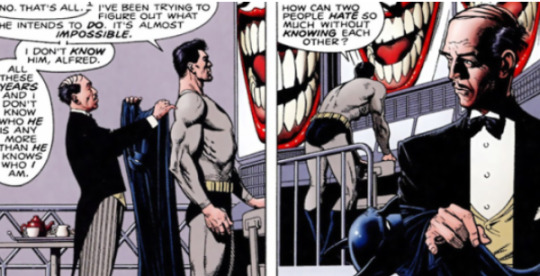
Shigaraki and the joker both experience a moment where they snap. Almost as if their entire lives have been defined by one bad day, where a lot of it amounted to coincidence. Joker loses his whole family in one day and falls in the chemical tank, Tenko’s quirk activates after a particularly bad day of abuse in his abusive household and his family is caught up in an accident, and then when his father attacks him he tries to defend himself.

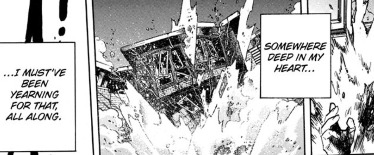
Here is the primary difference though. With Joker there’s the idea written that Joker was like that all along, that he wanted to hurt people and take out his shitty life on others, and that his madness just revealed feelings that were already there. This mostly works in the case of the joker because he’s a bully, a bad person, that’s who he’s always been.
But, Shigaraki is 1) five years old, and 2) we see the kind of person Shigaraki is before trauma.
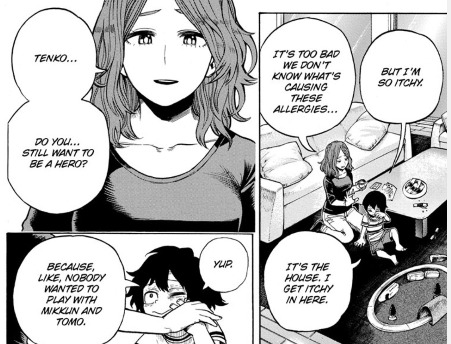

He’s a kid who is in fact, victimized by the patriarchical ideas of society. Unlike the joker who believed he deserved more, not only was Tenko literally just a kid trying to be himself and follow his own dream who was abused by patriarchical authority figure in his own house, but Tenko even as a victim still cared about the feelings of other people, fellow people who were being excluded like him and he went out of his way to look out for them.
There are absolutely no hints that Tenko was simply a bad person all along, and that he was looking for the excuse to simply act on his impulses to hurt other people and destroy things. In fact this idea itself appears in story as a narrative that All for One feeds him in order to manipulate. The Joker’s ideas appear in the story, but the one that uses them, the one that’s just a bully taking advantage of weaker people is All for One, not Shigaraki.
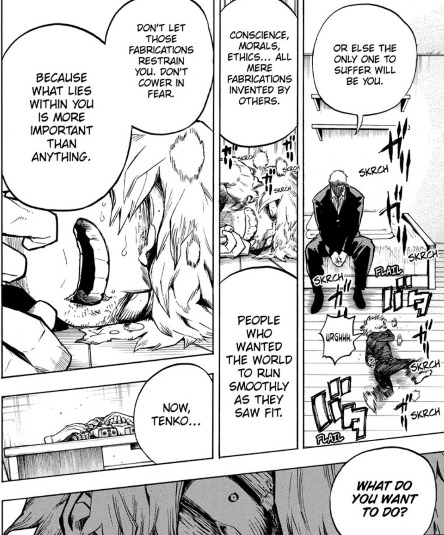
Shigaraki is deliberately raised not to have empathy for others, to only act on his own impulsive feelings to destroy, to be impulsive, to act to hurt whoever he wants, whenever he wants.
Now, I don’t know if there are truly good or evil people in this world. Good and evil might not even be real, but, at the same time jerks are real, and they’re out there in the world being jerks. For the sake of simplicity let’s just define a jerk as somebody who does not care about the feelings of other people in the least, especially when it comes secondary to their own feelings. Shigaraki does not fit that criteria.




Shigaraki listens to the people around him, he treats them with care. Even though Shigaraki suffered one bad day, and then several bad days after that, the part of Shigaraki that All for One tried so hard to destroy where he actually wants to reach out and connect to others and stand up for them is still there.
So, in a way Horikoshi is using Shigaraki for a much more empathic take of one bad day, which sort of validates both sides of the argument. Yes, someone’s entire life can be ruined by one day and they can fall through the cracks that easily and the society that was supposed to take care of them won’t. It’s a stance that acknowledges that villains are made, and trauma exists and will always affect people whether they are good or bad people.
However, at the same time that does not necessarily mean the person you are will be gone forever. One bad day cannot destroy you. The Joker’s view is pessimistic because he believes there’s no hope for someone like him, that both he and batman are completely broken and will have their lifes defined by their one bad day their entire life. Whereas, not only are the good parts fo Shigaraki still in there, but he also is someone slowly recovering from his trauma when placed in a much healthier environment. The Shigaraki at the beginning of the manga, and the Shigaraki we know now are different, because Shigaraki does not want to be stuck in one bad day his whole life, he’s trying desperately to become his own person outside of his trauma.
In the end, one bad day can in fact ruin your entire life. Which is why the message of the Killing Joke ends up coming off as a little ableist, by saying that if you were a good person you would not have let it ruin you. It’s kind of like saying that Dabi is a bad person because he chose to be a villain in response to Endeavor’s abuse, even though Shouto was abused and chose to become a hero. Like, that’s a pointless argument to make, and holds Dabi accountable for his own abuse instead of holding Endeavor accountable for the people he abused.
Shigaraki isn’t the joker, because Shigaraki is a lot more human than the joker as a character.
2. Twice’s Bad Day
The other fundamental difference between the Joker and The League of VIllains is that the Joker really is not trying to make any kind of anti-establishment point, nor does he really care about the society around him, whereas the League of Villains definitely does care. The Killing Joke isn’t actually about society, but My Hero Academia, the central conflict of the story is about the society the story takes place in, a society that basically manufactures it’s own villains.

Twice, just like the joker, and just like Shigaraki is someone who is driven insane by one bad day. Specifically because society as a whole neglected him and let him fall through the cracks. He’s also like the joker, someone who while at the same time as being insane, genuinely is able to observe the world around him from an outsider’s viewpoint and pick up on things. He tends to be more aware than the other characters, even while babbling like he’s just comedic relief.

However, Twice’s views are also in direct contrast with the Joker’s. Twice himself believes that it’s fine that normal people are able to enjoy their normal everyday lives, and that people exist in this society who have no problem fitting in at all.
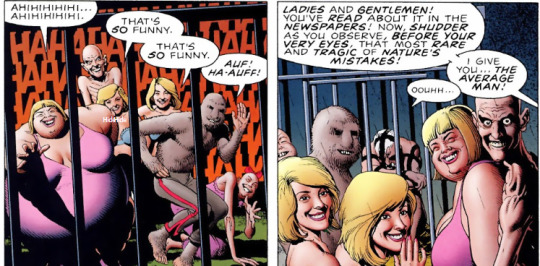
Whereas, the joker loathes normal people and anyobdy else who can fit into society in a way that he cannot. He dismisses them all as idiots and laughs at them. That’s because, as a character Twice is far more self aware, unlike the Joker who is in denial of his want for people to understand him that’s exactly what Twice wants and admits to wanting. He knows his views are outside of normal society, so instead of trying to prove that he’s right, Twice seeks out people who are like him.

He also knows that society will not try to save or sympathize with a person like his. The thing is the things Twice is saying aren’t grandiose claims to the true meaning of the world or seeing through everything, instead they’re much more grounded observations that are true because My Hero Academia is trying to prove a society that has failed people like Twice.
Twice’s story even mirrors the joker in several ways. He is basically the same, a guy down on his luck, dealing with poverty who eventually resorts to crime when all of his other options fall through.
Let us count the actual societal injustices that are present in Twice’s Backstory. Twice obeyed the law, and the person he hit did not. However, because the person he hit was a rich person and Twice was not, Twice was the one who was punished instead. Almost as if laws that supposedly protect everybody favor rich people and people with power already.

The foster system left Twice alone when his parents died from a villain attack.

Not only is Jin given a permanent record which affects all of his future employment because society treats felons like they are not people, but rather a lower class, but he also was fired from his job because someone abused the power they had in society to carry out a personal grudge against Twice. That person got away scott free and Twice lost his entire livelihood.
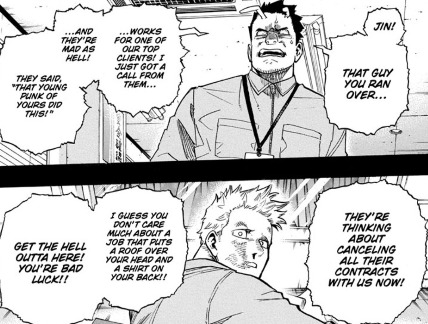
Twice retaliates and he turns to crime in order to survive, and yes there were better ways that Twice could have responded, but the only reason that Twice was put into the situation in the first place was several abuses of power in society directed towards him. People like to insist over and over again that victims should always just remain good people forever, without lashing out, or hurting others in order to survive but then not say how they are supposed to survive in those situations.
Twice however, takes full responsibility for his actions and realizes that his lashing out, his decision to live selfishly and steal and try to live the good life abusing his quirk was not what he wanted at all. His actions result directly in his bad day.

However, Twice too is given an option to recover. All it takes is one bad day, and anyone can become a villain is not the Joker trying to point in the context of My Hero Academia, it’s a statement of empathy. That Twice, Shigaraki are not alone in their trauma. That they are both able to find each other, and start to see themselves as human when they realize they were people driven to be this way and not bad people who were always this way. In Horikoshi’s writing it becomes a much more humanizing statement.
The sense of understanding that Joker is depserately trying to find in batman by proving a point, by forcing him to see the world this way, Twice and Shigaraki find in each other.

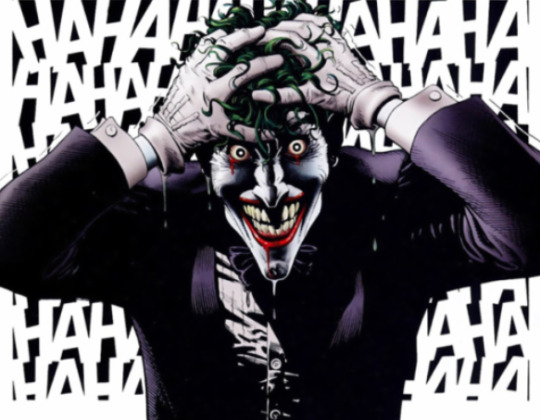
The Joker’s descent into madness is sign that he is permanently broken, whereas when Twice imitates that same pose and expression it’s used in a moment of healing for him. It’s him realizing broken as he is, he’s still here, he survived his one bad day.
As a final note, while portraying this humanizing message Horikoshi also manages to succesfully illsutrate the original point of the killing joke as well. It’s almost like having multiple examples of mental illness present in your stories, you can better explore the more negative reactions to mental ilness as well without coming off as ablist.
The commentary that Joker is a part of the society he thinks himself better in, that he repeats what he’s trying to subvert, that he entirely fails at sattire is something that is repeated in Rikiya.
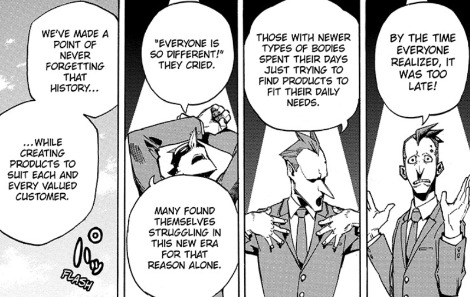

Rikiya and Joker are both capable of observing the society around them. They know the society around them is wrong. RIkiya’s ideals as Re-Destro that people should not be judged by their quirks and that quirk society as a whole tends to restrict people entirely based on their quirks, something that they are born with and cannot control, and that society should be trying to adapt to people and change rather than just putting certain people down for the benefit of the people who can fit in better.
However, both the joker and Rikiya are shown explicity not really to have attachment to the other people around them, or see them as people. They are jerks. Rikiya sees people as dispoable sacrifices to his great goal of reforming society.
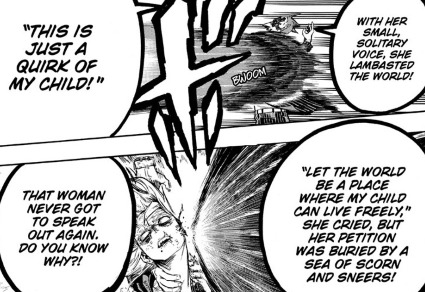
Rikiya however speaks of how evil society’s prejudgices is, and then he goes and repeats them. He looks down on the league of villains for being poor and disabled when he himself is a wealthy businessman. He suggests that Shigaraki is uneducated as an insult to put him in his place.
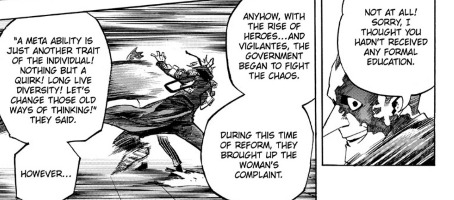
His followers who espouse how people should not be judged by their meta abilities, judge the league as worthless and unworthy people because of their quirks.
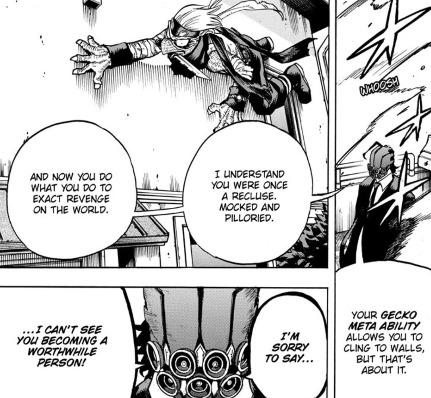
Destro says not to judge people by their quirks, and then goes and immediately insists that Shigaraki can only be a bad person who wants to destroy people, because he happened to be born that way.
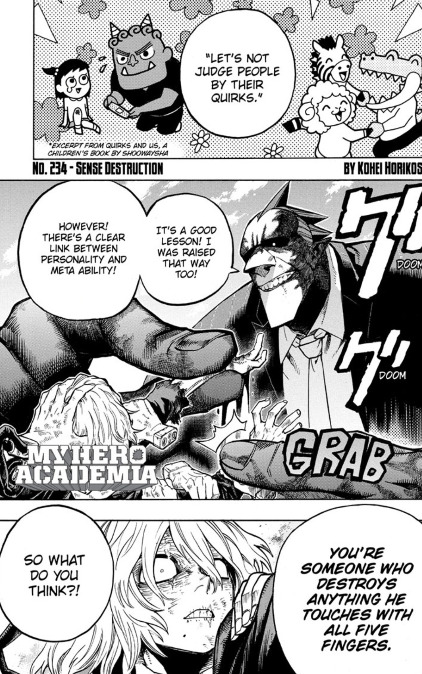
Re-Destro claims to be anti-establishment, but not only does Rikiya thrive in this exact kind of society (he’s a wealthy businessman he’s on the top of society, punching down at people who fell through cracks and were living as genuinely homeless going day to day for survival), but even if he were succesful at destroying the current society his ideals would just recreate the same unbalanced society just with him at the top.
Rikiya would create a society where people are still discriminated on based by their quirks, he would create a society where people with stronger, flashier, quirks are able to have more freedom in life, and find more success and people with weaker quirks cannot amount to anything. How is that any different from the society he’s a part of?
Rikiya is a part of the society he is trying to destroy. Yet, even he is still a victim in a way, he was raised in a cult to think that way and told that he had to believe these things because of who his father was, and he’s constantly at conflict with himself because of it.
Rikiya, Shigaraki, and Twice in addition to other members of the League of Villains who fell through the cracks, all of these characters read as responses to different aspects of the jokers character and different ideas he presented in The Killing Joke. Rather than just a reference though, it is an intelligent response, that Horikoshi clearly made these ideas his own and shows off his priorities in wanting us as the audience to forget that these characters we call villains are human first.

In the end the Killing Joke and My Villain Academia play with the same ideas to come to different conclusions. The Killing Joke ends with the idea that an insane person cannot save another insane person. Batman cannot save the joker. The joker is not someone who can be saved, and at the realization of that batman starts to strangle him and gives into his worst instincts to commit police brutality.
My Hero Academia uses those same ideas to tell a story where insane people can save other insane people. Unlike Batman and the Joker, I genuinely believe that Horikoshi is writing towards a conclusion where Shigaraki is someone who can be saved by Deku, not someone he is meant to continually fight with until one of them dies or the other.
In the end they are two different stories one of them illsutrates a failure of empathy and the other illustrates how empathy among insane people brought them together.
#mha meta#lov meta#shigaraki meta#shigaraki tomura#jin bubaigawara#twice#yotsubasa rikiya#league of villains meta#league of villains#the killing joke#my hero academia#my hero acadmeia meta#my hero academia theory#my hero academia analysis#meta
228 notes
·
View notes
Text

So, basically why is Re-Destro still around? Interesting question anon. There’s a lot of possibilities for keeping him around and I can go through a few of those. Re-Destro is different from both Chisaki, and Stain because unlike being defeated with only the remote possibility that they might return later, Re-Destro despite being defeated sticks around at the end of his arc.
The strongest reason for him staying is because Re-Destro is there to service Shigaraki’s arc. It’s not so much for Re-Destro’s own sake as what his survival shows for Shigaraki. Remember, the reason the last two villains were defeated was also because Shigaraki went out of his way to destroy them. Shigaraki is an extremely self loathing person who tries to destroy his negative foils in the most gruesome way possible.
However, this time around we see Shigaraki reach an acceptance of himself and his past. His memories return and he is able ‘accept’ them in a sort of way and embrace the fact that he was the one to destroy his family. Therefore because of that level of self acceptance he has reached, Shigaraki does not feel the need to destroy the negative foil in front of him.
In a jungian sense characters will deny things within themselves, and project those insecurities onto other people as a way of exercising them. The most volatile way to do this is to attempt to physically harm or destroy someone as a symbol of yourself. Shigaraki goes out of his way to try to destroy Stain by summoning the Nomus, he actually cuts off both of Chisaki’s hands removing his quirk.

Both times he was trying to prove himself by destroying the person that resmebled him. In doing so he also reaffirms himself.

Shigaraki basically “steals” from these lesser villains in order to learn and keep going. As I elaborated in my meta, Shigaraki has an extremely unstable sense of self, being locked up in a basement and cut off from all human society will do that to you. All of these confrontations he has with other villains are really just confrontations with himself. He steals a part of them, makes it his own, learns something and then continues on.
Until this point Shigaraki’s sense of self is so unstable he can literally only exist if he crushes everyone who gets in the way. Which is why Stain getting more recognition than him bothers him so much. Because then Shigaraki is not being seen, it’s like he doesn’t exist.
What Shigaraki really can’t stand is “other people” because he is so isolated himself. “Other People” are of course a part of everything, the world he is not welcome in and never will be. So the question is why did Shigaraki not repeat the pattern the third time around? Why did he accept Re-Destro’s surrender rather than try to destroy him the same way he did with Stain, and Chisaki.
Once again his act of sparing Re-Destro is there to show his growth. Shigaraki has progressed enough as a person, and accepted himself to a point where he can now stand to see other people. Because he recognizes the league as people different from him, who are still around him and accept him because they want to be there Shigaraki’s own self is much more secure. He no longer feels the need to completely detroy the enemy he is fighting against to prove something about himself.
Which is why the reason Shigaraki ends up sparing and accepting Re-Destro’s surrender is because of Compress’ suggestion. That if they decided to cooperate with the eight precepts rather than destroy them then they would have access to much more resources. Shigaraki’s maturation and his realization he can spare Re-Destro and turn a former enemy into an asset is prompted by the acceptance of his friends thoughts and feelings and his active effort to listen to them and care for their needs.

I also think symbolically, Re-Destro is spared by the plot because of the similarities in their backstories. The two of them are both children who were brainwashed from a young age into becoming successors to a cause that they don’t necessarily even want to fight for, because of the family they were born into and nothing else. They both have to live tremendously burdened.

However in the end, rather than being crushed and destroyed by his burdens, Rikiya is deliberately spared by them. Someone came along to liberate him.

Therefore the choice to spare him and his foiling with Shigaraki indicates two things. That one, Shigaraki desires for the same thing, a liberation from the cycle of destruction he himself is caught up in, and two what he desires is different from what All for One threw on his shoulders. Therefore if Rikiya is given this chance by the plot, then logically it’s there to set up the idea that Shigaraki will be set up in the future with this chance as well.
As for Rikiya’s character itself, yes he’s mainly in the story to serve as a foil to Shigaraki but there is some interesting character growth going for him. So let’s talk about his own character for a few minutes.

What he’s going through right now is still a regression. Basically, every MLA member that was spared by the league of villains is going through the same regression. They lost the fight so they’re stuck dealing with the consequences. Trumpet is watching his boss act like a sycophant, Rikiya is kissing up to Shigaraki and has become utterly passive, etc. etc.
This strikes me as a simple case of overcorrecting. More or less, Rikiya realized that all of the burdens he thought he had to carry in life were unnecessary. So, his response is to rid himself of all burdens whatsoever. Rikiya has essentially stopped thinking for himself and become more or less a slobbering lapdog, because he thinks that leaving everything to Shigaraki will relieve him of the pain he was carrying all along.
Obviously, that’s not going to work. As of the moment I don’t think Rikiya’s personality has 180ed, so much as he desperately wants it to. He wants to appear as a loyal servant to Shigaraki and someone who does not think for himself anymore, because thinking is what makes the stress pile up.

However there are several instances of foreshadowing that Rikiya is as sharp as ever. Hawks already suspects that Rikiya might be on to him and there’s tension building between the two of them. So, I expect we’ll receive yet another flip for Rikiya in the future when we’re reminded exactly how dangerous he is as a person, and that moment will be the deciding point of whether he’s going to improve on the second chance he was given or learn from his mistakes, or stay in denial as he is right now.
73 notes
·
View notes
Text
Shigaraki vs Redestro
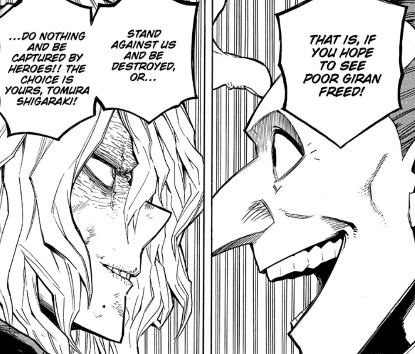
Every time Shigarak goes through an arc in which he is not the main villain, but rather fighting another villain, starting with Stain, then Chisaki, and most recently Re-Destro it not only becomes a battle between them but also a comparison of them as people. Shigaraki is not just fighting his own villains, he is up against his own shadows, people who are like him but not. A battle against them is a battle against himself in a way. Every single one of the antagonists Shigaraki faces is actually a foil with several things in common with him, I already wrote a similiar post on Chisaki here.
Below the cut, the several things that Shigaraki and Redestro have in common, and the difference that will allow Shigaraki to grow in a way that Redestro hasn’t, making Redestro his stepping stone.
1. Upbringings
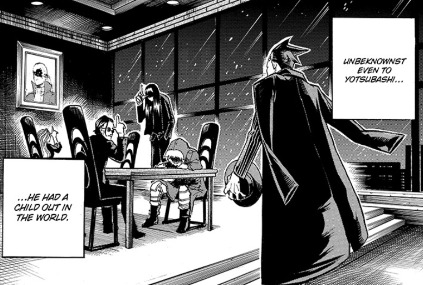
We do not get to see Re-destro’s backstory nearly to the extent that we see Shigaraki’s but, there is still enough there to give us a lot to infer. First, Destro similiar to All for One is someone who at one time held a lot of power in quirk society, Destro in his army fighting for quirk liberation and All for One being the king of the underworld. They are also both people who have fallen considerably out of power, Destro was defeated and his army had to go into hiding, and All for One was wounded near-fatally by All Might and was put on life support. Which makes both Shigaraki and Re-Destro the successors to a considerable legacy behind them, they’re kings who basically inherited a crumbling empire.
Not only that but both of them inherit it from what is primarily their father figure. Destro is Rikiya’s biological father, whereas Shigaraki took the name “Shigaraki” from All for One who renamed him from Tenko Shimura after the death of his family and raised and groomed him into being his successor.
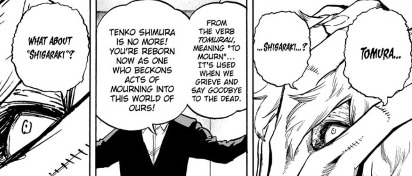
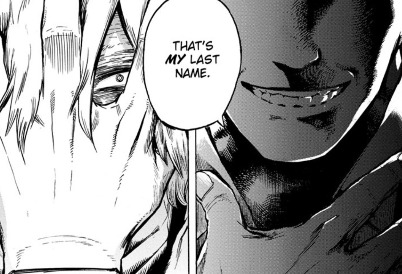
Also, important to both characters is that while they were raised as a successor and modeled off their father figure, in both cases neither All for One nor Destro was ever a true father to them. Destro apparently did not even know that Rikiya ever existed, which makes Rikiya a bastard who got saddled with the legacy of a man he never even met. Whereas All for One never intended to act like a father, just use Shigaraki Tomura as an extension of himself.
All for One never saw Tenko Shimura as an individual person or a child to raise, he is a tool to further his legacy and that’s it. He is an object that All for One left behind as his lingering regret and revenge against All Might. What happens to Shigaraki the person he could care less, as long as Shigaraki fulfills his obligations and designs in his place as All for One’s life force fades away.
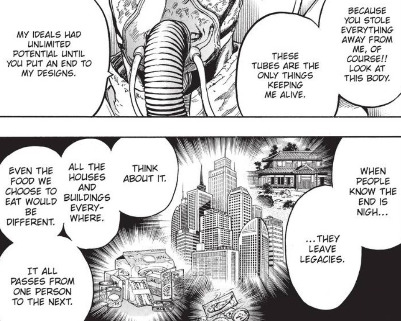
Which is why the two of them both have this similarity, their fathers have defined their entire lives. Re-destro does everything for the sake of a father that he never met. Not only did Shigaraki live in a household where his father, the patriarchal authority of the house decided who Shigaraki got to be and restricted him from becoming a hero like he desired, but afterwards he fell into the clutches of All for One who then further shaped him to be hateful, and despise the world to better fulfill All for One’s desires.
Their entire lives have felt the weight of this burden, just because of who they happened to be born under. Remember, Tenko is the child of the son Nana abandoned. He literally has no idea that Shimura Nana was a possessor of All for One, and yet he had to suffer the lingering effects of Shimura Nana’s decision to abandon her child. All for One targeted him because of his bloodline that he had no control over. Not only that but Rikiya is once again a child his father never even knew about. He was just once a fatherless child who got dragged into all of this and burdened with his father’s legacy.
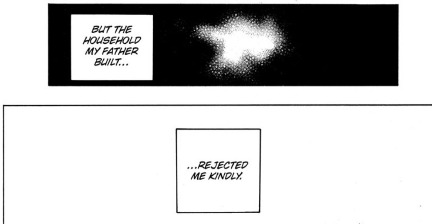
Considering the fanatacism of using an entire city to attack six people, and their devotion to Rikiya it’s extremely likely that Rikiya was raised in a cult-like environment where the followers of Destro in hiding controlled basically his entire world, and cut him off from the outside world. The same way Tenko Shimura was raised in a small room by All for One with only limited contact with the outside world that All for One allowed, and only negative violent contact because he knew it would foster even more hatred in Tenko’s heart for the world. Which means at one point both of them were just indoctrinated children. Imagine forcing a grudge of several generations all on the shoulders of a child, it’s no wonder both of them carry so much stress in them.
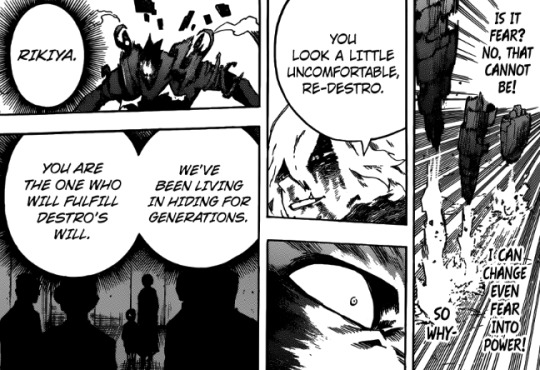
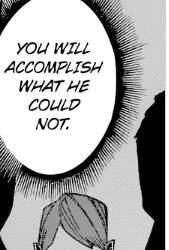
2. Emotion Based Quirks
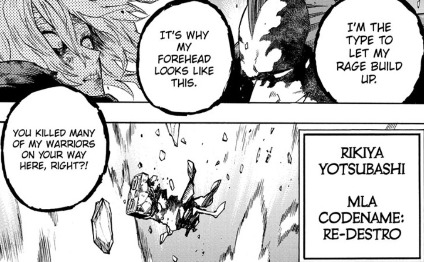
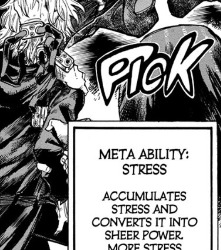
Both Shigaraki and Re-Destro have quirks that increase in power and potency depending on their emotions, and they also both have personalities where they accumulate stress and then at the last moment lash out and destroy everything around them.
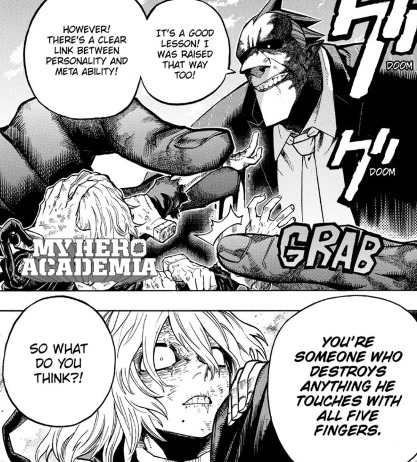
They were both raised to think that way as well, that their quirk defines entirely who they are as a person. It’s quite obvious in the way Apocrypha was raised, and what he spouts as the Liberation Army’s Doctrine. People are only worth the strength of their quirks. Their quirks began to define who they were. However it’s important to remember just because they were born with those quirks, does not mean they were born that way as people. Rather, they were both raised to believe that they were always born to be this way.
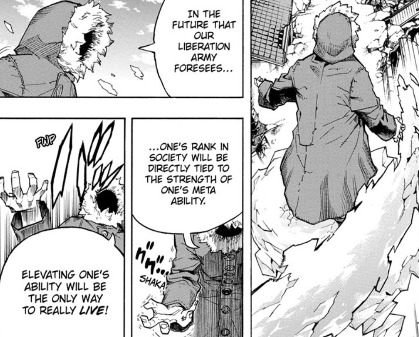
So then, let’s look how each of them see both themselves and their quirks. Rikiya has the narrative that he is Re-Destro’s son, therefore him and all of his strength exists to carry everything Destro left behind. He believes because Destro’s blood runs through his veins, that he was born to carry the burden of history that Destro left behind for him (even though Destro never even realized he had a son in the first place).
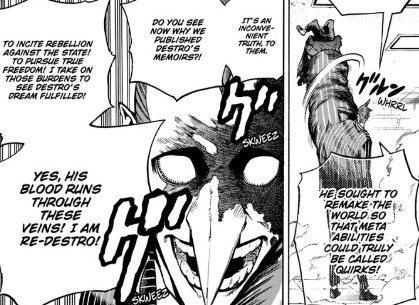
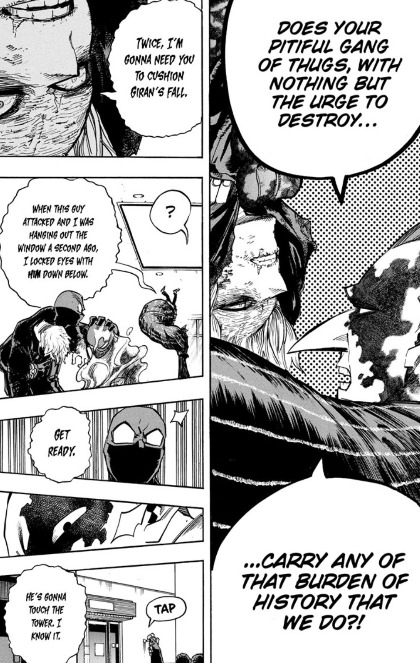
Therefore narratively, both his tremendous stress and his tremendous strength makes a lot of sense. He is an atlas, believing that he carries the whole world on his shoulders because his father put it there for him. He needs that massive amount of strength to remake the world as Destro sees fit, but not only that Re-Destro has been impossibly burdened since he was a child. That is a lot of stress all to throw onto one child who did not even know he was Destro’s son to begin with.
Re-Destro seems like a fanatical who is completely happy to carry on his father’s legacy, but remember at one point he was just a child who got taken in by a cult and indoctrinated. He probably forces himself to believe in all of it because the other possibility, that his father did not even know about him, and did not leave him anything behind, and that the burden that has been stressing him out his entire life is just imaginary something somebody else forced on him instead of something he was born to do is too much for him to face. The truth is it Re-Destro isn’t defined by who his father was, and he doesn’t have to do anything based on whose blood runs in his vein, but he imagines that he is compelled to take on Destro’s legacy because he is his descendant. He believes that there is meaning in that, because it gives meaning to his suffering.
Re-Destro calls his acts for the purpose of liberation, but really he’s more restrained than anybody else. He’s tied to a destiny of a stranger, and who he has no true idea what his wishes were, but fanatically convinces himself he has no other choice but to follow in his footsteps. It’s a massive burden to put on a child. Re-destro doesn’t have a family, he has a man who he has modeled his entire life after despite never meeting him. Part of him secretly desires to be free from all of that, which is why he envies and wants to destroy Shigaraki who he sees as being an upstart brat who was never forced to carry the tremendous burden every day that he was, and simply gets to do whatever he wants.
He can’t see Shigaraki as a victim of the legacies that they both carry, because that would be admitting to his own victimhood as well. Therefore, Re-Destro’s quirk is a metaphor for how much the burden he is carrying on his shoulders, makes him want to lash out and destroy everything around him to feel some semblance of freedom not from the suppression of quirk society, but rather his cult-like environment which raised him to feel like his only choice in life was to inherit Destro’s will. His environment is one of constant stress and burden which he can only accumulate further and further until he lashes out. The person who wants liberation is more restrained by his own ideals then anyone else.
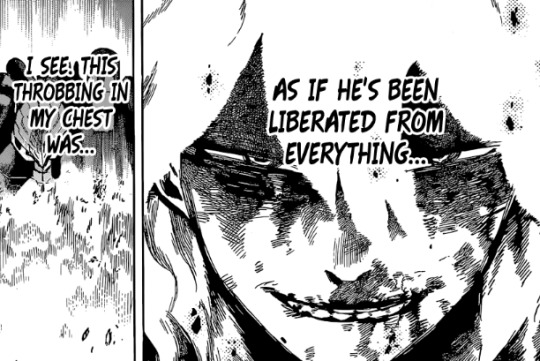
Re-Destro feels a constant throbbing in his chest due to his resentment for his lot in life that he’s suppressing. Shigaraki feels a constant itching which is also due to the stress he feels towards his own environment.
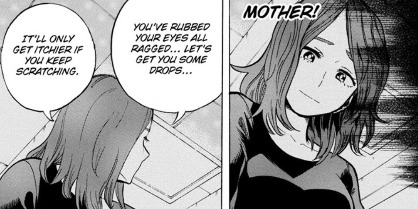
It’s not confirmed yet, but Shigaraki’s allergies and his scratching are at least suggested to be stress related. He always does them compulsively, and shows signs of the mental illness exociration when he scratches at his own neck.
One of my theories which I will go more into depth later is that the itching feeling, is his quirk activating on his own body since it’s not totally compatible with it the same way that Dabi’s is not compatible with his body. However, due to Tenko holding it back subconsciously almost all the time his face only gets mildly irritated.
The itch is also most likely a psychological feeling in reaction to the stress of his environment. Tenko is raised in an abusive household where he is not allowed to be himself, he feels a constant itch and unease. Abusive households are stressful because children feel constantly in danger in them, children can even develop post traumatic stress disorder from having to adjust to living in a constantly unsafe environment. Tenko even says if someone had rescued him from that environment, he thought the itch might have gone away.
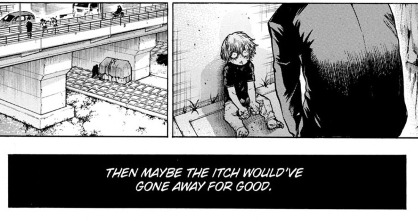
However, instead he moves from one unstable environment to another. Tenko is taught that hurting other people and lashing out will make the itch go away temporarily. Abuse victims often lash out in ugly ways, and hurt the people around them to temporarily vent the feelings they are carrying with them, but once again this never works to make the feelings permanently go away.
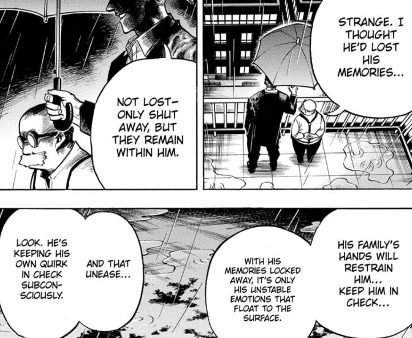
All for One even says this directly, that Shigaraki’s quirk is related to his emotions hence why we see much more destruction during his initial use of the quirk against his family as a child then much later when he is fighting Aizawa for example. Which is why All for One not only encourages to keep his resentment in his heart, but also to chain himself to the memory of his family, because it’s a way to guarantee his quirk will only be used for destruction while at the same time also keeping Shigaraki under control and chained to him.
Shigaraki is freer than anyone else because he believes he simply does whatever he wants to do being a villain who lives in the underbelly of society, and yet at the same time Shigaraki is chained to All for One’s legacy, and the man who has had a hand in manipulating a significant portion of his life. That way he is both free and burdened like Re-Destro, and that is why his stress only continues to accumulate. Shigaraki’s quirk, much like Eri’s probably does not only have to have negative uses but All for One shaped him in a way that he would only lash out, only use his quirk in the most destructive way possible, only allowed to act on his worst impulses. Shigaraki believes he was born this way not moulded.
Shigaraki’s true desire deep in his heart has been to be free to be his own person, not a hero necessarily, not a villain either, but to be able to be the person he wants to be. He believes that by following All for One, because he can do whatever he wants without attachment or the oppression of his previous household he is allowed to do that but once again he’s deluding himself.

If Shigaraki’s true goal was to be free to do whatever it is he wanted, then he would just massacre all of his allies like he did really on in his character arc. However, we see that what Shigaraki really wants isn’t freedom from all of his attachment, because he genuinely values his attachment to those people. What he needs to realize is that there are healthy and unhealthy attachments, and while he claims to have rejected everything from his past he is still acting in the narrative All for One gave him, in the way All for One wants him to. True freedom is something he has to define for himself. It’s a meaning he has to create after he’s tossed away all other meanings. Re-Destro secretly wants to throw away all his burdens and attachment to the meta liberation army, whereas Shigaraki is someone who in a much healthier environment is accepted for who he is already by his comrades and just needs to learn to be that person.
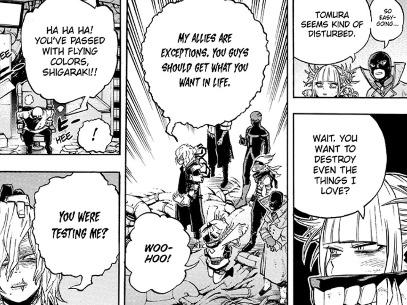
Once again, in both cases lashing out does not solve either of their problems. It only makes them believe that the feeling has gone away temporarily. Rikiya believes Shigaraki is free, because destroying his family legacy is what Rikiya has always secretly wanted to do to taste that freedom for a moment. Yet, as long as he still is trying to prove himself to be worthy of being All for One’s successor Shigaraki cannot truly be free, especially since he defines freedom the way All for One wanted to rather than his own way. If he exists as a Symbol of Fear, than he has yet to become a person, he’s restrained to being a symbol for others the same way All Might was restrained as being the Symbol of Peace.
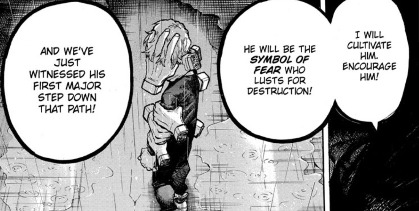
Shigaraki’s gotten the power up that he needed, but the problem that accumulates the stress in the first place has not been solved by this. In fact, the doctor intentionally put him in a stressful environment and risked his life and harmed him intentionally just so Shigaraki would get stronger to further his own purposes.

Therefore, neither of them Shigaraki or Re-Destro can reach the full potential of their quirks just yet, because neither of them can self-actualize. However, between the two of them Shigaraki is much closer. As he at least is conscious of his desire to be free of things, even if he is still following the narrative All for One gave him.
Ultimately that’s the irony of the two successors, Shigaraki believes himself destroying everything for no purpose and with no meaning and yet he’s still defining things in a narrative sense. A symbol of fear is still a symbol, it still has meaning, it’s still a role to play which All for One gave him. Whereas, Re-Destro sees meaning where there is none because he did not have to magically become his father’s successor because of shared blood. Re-Destro was allowed to become whoever he wanted to be and yet he only ever became what others told him to be. Both of them see each other as fools, because Shigaraki sees Re-Destro as restricted by the legacy of his bloodline (in the way Shigaraki is) and Re-Destro sees all of Shigaraki’s actions as meaningless and not attempting to build anything, and him being a nobody just a child dragged into this conflcit (in the way Rikiya is).
3. The Power of the League of Friendship
In both cases, the league of villains and the meta liberation army are all fanatically devoted to their leader. Unlike Chisaki, Re-Destro does seem to actually care about his followers. He personally interacts with almost all of them and moulds them, which is the reason they are so devoted in the first place.
However, the way they treat individual lives in their organization differs greatly. Re-Destro demonstrates this in his introduction, he seems to genuinely know his subordinate as a person, and values him quite a bit he even extolls the reason why however the second that subordinate expresses an opinion of his own that disagrees with him Re-Destro snaps his neck.
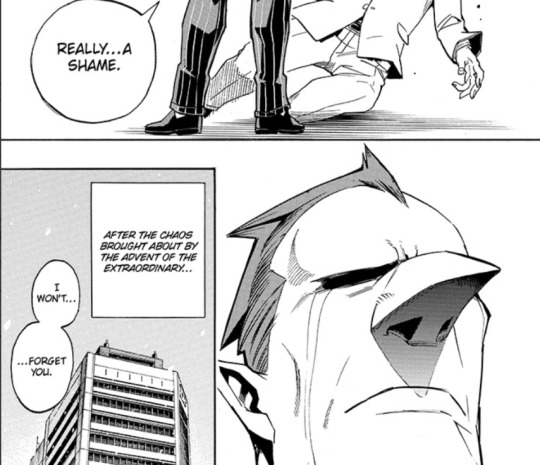
He also cries over it. I genuinely believe those tears, and his expression of remorse is not fake at all. Remember, Re-Destro is burdened to do things he does not want to do, and was indoctrinated that way since childhood. That is why so much of his stress accumulates. He probably believes genuinely that he wants to value his subordinates lives more than anything else, but has been taught the opposite that they have to be willing to give their life for the sake of the cause. Hence another reason why Re-Destro secretly hates the cause he has been burdened with his entire life so much.
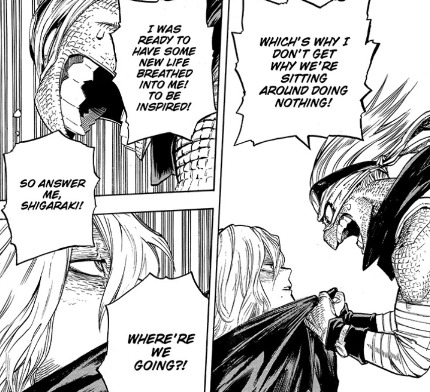
Compare this to Shigaraki’s introduction in this arc, a subordinate grabs him and screams his opionions in Shigaraki’s face, and yet Shigaraki just calmly accepts it all and tries to explain himself.
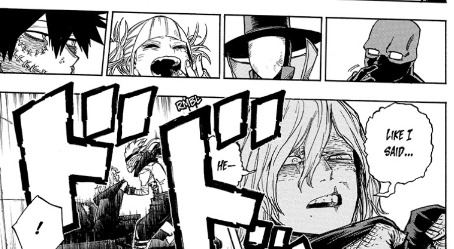
In the league of villains they are allowed to express themselves as individuals, and they are equally valued and accepted for who they are. Even the less sentimental members like Dabi, are still trusted by Shigaraki to go off and do their own thing.
The league of villains are all still outcasts and degenerates, but as a whole they are much more sane, much more their own fully realized individual people. They question Shigaraki, they joke at him, they even complain to him constantly. They are treating him like a person even if they are loyal to him. Whereas, All for One’s subordinates are all completely devoted sycophants who seem to lack any thought in their heads besides what they can do for All for One’s sake.
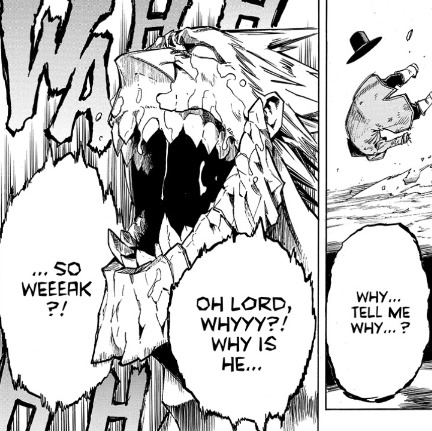
Compare the way Shigaraki treats his members to the way Rikiya leverages them. Shigaraki risks the entire league just to save one member, but not only did several members of the league ask him to do this, but they also consent to following along with his plan because it means saving one of their own.
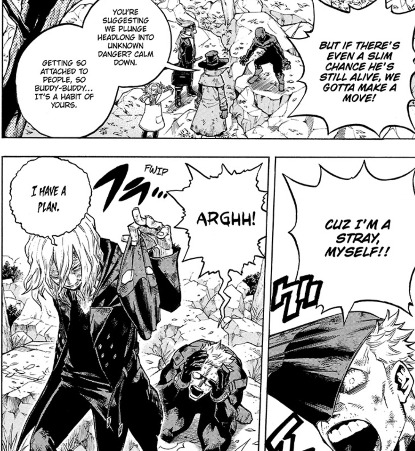
Not only that, but in the past against Chisaki, when Shigaraki risks the league again to get revenge against Chisaki for Magne’s sake after losing her, he once again asks for Twice and Toga’s cooperation and tells them his true feelings on the matter that he wants them to do this for all of their sake even if he’s asking them to put up with something hard.
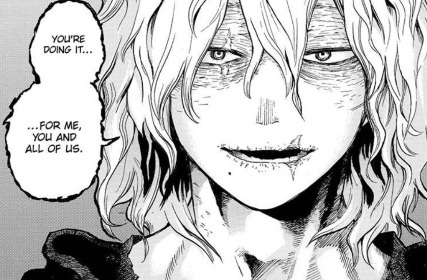
While Rikiya may genuinely value the lives of his subordinates and feel pain when they die in a way Chisaki never did, that does not change the fact that he basically wasted thousands of them and risked all of their lives to settle a personal grudge against seven homeless hoodlums. The ideals of his organization are far more important than individual lives, and everyone in the meta liberation army is raised to value their life second.
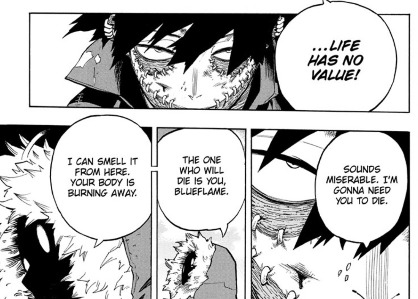
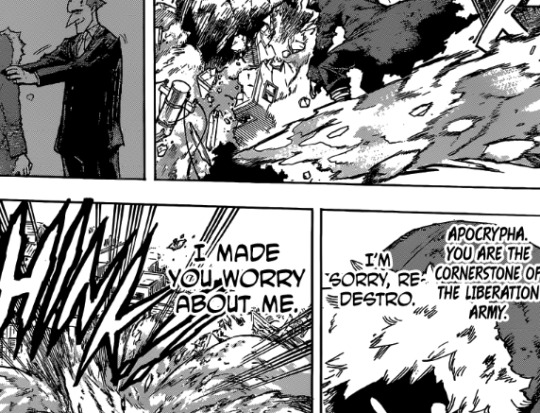
Which is where the inherent hyporisy in Rikiya’s ideals comes from. He believes people should be free to use their quirk without suppression, and should be defined by their quirks. He believes that the current society that represses individuality because some quirks are more dangerous than others should be destroyed. And yet, he indoctrinates people to believe their entire worth is based on their quirk, he wants to make a society where people are entirely defined by how strong their quirks are. His liberation is just another form of individual suppression under the banner of liberation.
Apocrypha apologizes for having to make Re-Destro show him the most basic level of concern. Really it is a cultlike atmosphere where even though it seems on the surface to be all-welcoming, ideals are valued far more than individual people, and that sense of acceptance is only used to prey on others and indoctrinate them further into their radical ideals.
Which is why the concern the league shows for Shigaraki’s life comes off as much more genuine from them. Every single person in the league is valued as a person, and while they are sometimes asked to do things for the sake of the league and cooperate they never disappear as individuals.
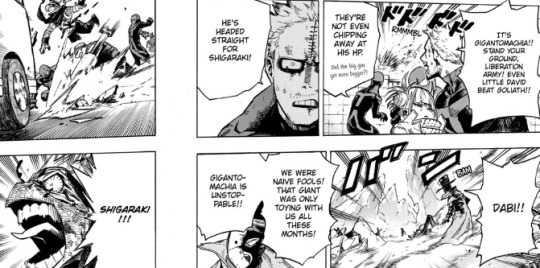
Even when people like Giran fail the league, they get rescued, and they aren’t punished for failure because they as a person are more important than just what their powers and abilities can bring to the league.
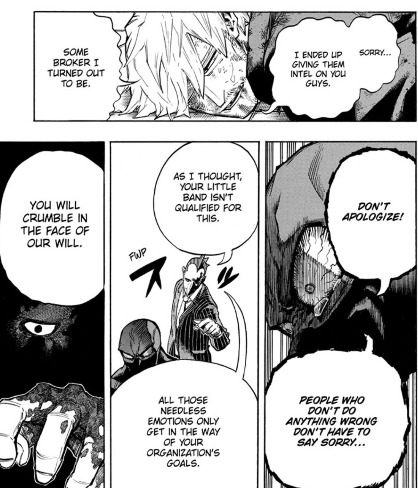
Which is why Shigaraki will triumph over Re-Destro, to Shigaraki people are far more important than ideals. Shigaraki is able to become a person in a way Re-Destro will never be or realize, because he was too busy trying to become an ideal, a legacy left behind, a symbol rather than Shigaraki who is making steps towards becoming his own person no matter how thorny, or long that path may be.
#mha meta#shigaraki meta#shigaraki tomura#shimura tenko#yotsubasa rikiya#re-destro#destro#my hero academia meta#league of villains meta#meta
241 notes
·
View notes